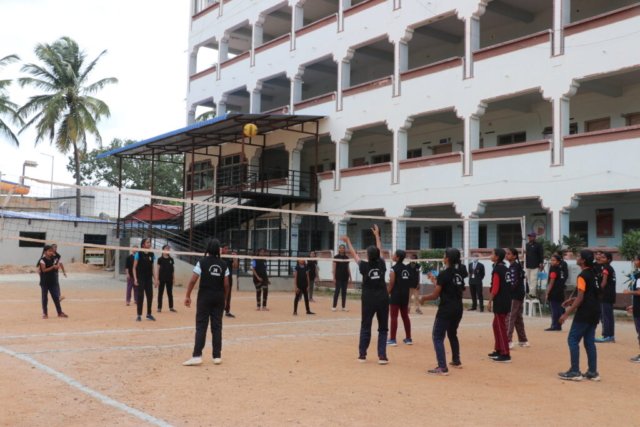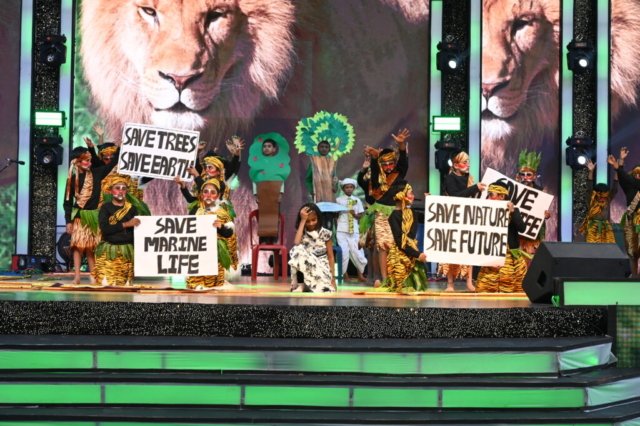Activities
- Club activities
- House system
- Cultural Event
At Indian International School we lay due emphasis on different activities through active participation in various clubs. We guide students to discover and create their own understanding. Besides academics, co scholastic activities form an integral part of the school curriculum. This aspect includes wide range of co-curricular activities. A student will be expected to choose any two skills from below mentioned sevenclubs and he/she will be assessed on their level of participation and achievement.
A. Literary club
The students actively participate in literary and creative skills at school. This skill includes those activities where students get a chance to learn and exhibit his potential when it comes to Debate, Declamation, Creative Writing, Recitation, Poster Making, Slogan Writing, Theatre etc. After acquiring the skill the student is ready to participate in various inter and intra school competitions.
B. Eco club:
Eco Clubs play an important role in creating environmental awareness amongst the future generation. .
The activities under the scheme include:
- Motivate the students to keep their surroundings green and clean by undertaking plantation of trees.
- Promote ethos of conservation of water by minimizing the use of water.
- Motivate students to imbibe habits and life style for minimum waste generation, source separation of waste and disposing the waste to the nearest storage point.
- Educate students to create awareness amongst public and sanitary workers, so as to stop the indiscriminate burning of waste which causes respiratory diseases.
C. Heritage club:
This club will explore the meaning of heritage to understand ourselves better, and to appreciate the cultural interconnectedness of the past, present and the future. This club will engage in activities that explore our personal and local histories as well as World Heritage properties to achieve our aims. The group will watch films, go for history walks, visit museums and galleries, build our family trees, village histories, etc.
D. Mathematics club:
Objectives
- To improve and bring out the hidden mathematical talents of the students.
- To promote enthusiasm and interest in mathematics among the students.
- To provide a platform for discussing new methods of learning and teaching mathematics.
E. Sports club:
The objective of school sports is the enrichment of the high school experiences of students within the context of the educational mission of schools. As such, school sports should be educational and contribute to the overall education of all students, not athletes only. Other objectives of school sports logically follow from the educational mission: citizenship, sportsmanship, fair play, teamwork, respect, and health and welfare of all students not only during the school years but continuing into adulthood.
F. Music club:
Goals of the Music Club include:
- Foster club unity through music listening, practicing and performances.
- Maintain the Music building, instruments, music, and equipment.
- Provide students with the knowledge so that they can read music on their own as well as take care of instruments.
G. Art and crafts club:
Art, craft and design stimulates creativity and imagination. It provides visual, tactile and sensory experiences and a special way of understanding and responding to the world. It enables children to communicate what they see, feel and think through the use of colour, texture, form, pattern and different materials and processes. Children become involved in shaping their environments through art, craft and design activities. They learn to make informed judgements and aesthetic and practical decisions. They explore ideas and meanings through the work of artists and designers. Through learning about
the roles and functions of art, they can explore the impact it has had on contemporary life and that of different times and cultures. The appreciation and enjoyment of the visual arts enriches all our lives.
The House System provides opportunities for students to develop all aspects of their growth and learning: personality, morality, creativity, knowledge and skills. The system promotes values of fair play, teamwork, citizenship, mutual responsibility, self-discipline, initiative, perseverance and resilience.
Participation in House activities contributes to excellence in academic, social, sporting and cultural fields.
There are five houses

Pallavas House

Kadamba House

Rashtrakuta House

Hoysala House

Chalukya House

Scouts

Guide
India is culturally purely society. We foster universal and eternal values oriented towards the unity and integration of our people.
Yoga
The emphasis on Yoga is not on spiritual practice but on achieving the body beautiful in keeping contemporary need in minds.
Taekwondo
Taekwondo Benefits. Enhance self-esteem by heightening your physical and mental powers. Build confidence by encouraging you to succeed and to take control of your life. Develop discipline by thoroughly training your body and mind in the tenets and techniques of Taekwondo.
Extra Curriculum
SPIRITUAL DEVELOPMENT
The balanced development of body and mind is the main root of spiritual development. In our school, the facilities of yoga exercise and simple meditation are available under the supervision of the qualified spiritual thinkers of “Brahma VidyaVihungam yoga”.
SELF INDEPENDENCE
The main aim of this school is to produce a self-independent citizen. The special syllabus and extra curriculum have been prepared for the development of self-dependences and good habits in children from the beginning. The students following up this syllabus become capable of doing their work without any hesitation. It helps to develop the concrete feeling in them, which will help them to face the challenge of life later on.
LEADERSHIP TRAINING
The school attaches great importance to this and has devised many programmes for imparting leadership training, chief among them being our students’ Executive Body. From Class VI onwards, pupils in each section elect six monitors (once again guided by the policy of maximum participation rather than minority elitism), each incharge of six different areas such as discipline, cleanliness, etc. The class section by secret ballot, are like our Assembly Elections at the state level.
All elected leaders attend week-end camps where through games, role-play, simulation exercises and other such experiential activities, children are helped to arrive at a definition of the role and responsibilities of leaders, traits that they must possess and how to grow into such a role. Those elected from their classes then vote for a General Secretary.
Those who are class monitors of Class XI can stand for General Secretaryship. Candidates for this position present their manifestoes at the school assembly. They are then allowed to campaign for four days abiding strictly by the rules laid down by the school. Once elected she/he chooses her/his cabinet comprising of the following area-representatives:
• Discipline
• Sports
• Science
• Literary Affairs
• Art & Culture
• Pragramme Implementation
• External Affairs
• Current Affairs
• School Facilities
• Coordination of Class Representatives
• Bulletin Boards
The Executive meets regularly for two hours after school on Saturdays. It helps the school community in a number of ways such as maintaining discipline and regularization of traffic, checking late comers and uniforms, organization of cultural activities and Activity Week. Young leaders learn to set goals, plan and work accordingly, foresee problems and take care of them, develop resourcefulness and courage to tackle unforeseen situations, acquire communication skills, understand people and learn to get along with them, learn to be sensitive to other’ opinions and respect them.
Self-Teaching Day
The self-teaching day is one of the most interesting projects undertaken by our school. One full day during the year is reserved for the occasion. Besides teaching on the day, the students-leaders manage the entire school. All the teachers, peons, clerks, sweepers and even Principal are “off duty” for a day. Students take up their work. The following are the objectives of this programme.
• To create a sense of responsibility among students;
• To help students understand the organizational structure of their school and its functions;
• To develop among students an aptitude for teaching as a profession;
• To let the students understand and appreciate the difficulties of a regular teacher, support or administrative staff.
• To develop confidence in themselves.
To realize that a position of power has to be held with utmost competence, responsibility and sensitivity.
























